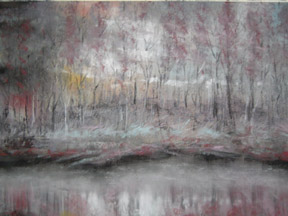|
|
THIRTY PAINTINGS — twenty-eight pastels and two oils — comprise this “tribute” to the Catskill Region, an exhibit* that celebrates the ongoing love affair with the area’s landscape that began with such early “Hudson River Painters” as Cole, Church, Kensett, Gifford, and Inness — to name but a handful — and which has been carried on to the present day by the latest crop of landscape painters. It’s customary to measure contemporary painters with those of the past — to suggest that this or that painter follows in the footsteps of this or that forerunner, if only in the spirit of complimentary praise — but the truth is that if there is indeed a “Hudson River School” of landscape painters, the only thing that connects them — and this is indeed a significant connection — is the unparalleled beauty of the natural surroundings that characterize the Hudson River/Catskill Mountain Region. Each painter — from Cole to the very latest tyro setting up an easel along field, rock ledge, stream, overgrown copse, dense thicket, or leveled field — interprets what is seen through an individual sensibility. There is a far cry from the aesthetic vision behind Church’s vistas to Gifford’s contained scenes, from Cole’s moral-laden fantasyscapes to Cropsey’s homey genre scenes. After all, such a diverse offering that the eastern part of New York State has to offer deserves no less than a believable disparity of responses. All artists worth their salt, then, have seen the riches of the region through their own eyes and predispositions — and Milbourn is no exception. Himself a painter of fine observational skills, Milbourn combines an accomplished grasp of draftsmanship with a sensitive eye for the beauty inherent in both detail and scope. He sees — and captures — the exquisite complexity of the struggle for existence between untended wildflowers (“Burst of Color”) as well as the breath-catching grandeur of dramatic skies (“Sky Falling” — and he finds the beauty of such natural phenomena in all seasons (“Spring Jungle”, “Autumn Haze”, “Winter Dust”). Especially arresting is Milbourn’s ability to convincingly bring up from his ground the fine detail of individual stalk, branch, or leaf — not an easy task when confining oneself to the medium of pastel. Close-up does not faze him as is so evident in “The Stone Wall”, “Tall Grass”, “The Dead Tree” or
“The Green Tree”, for
example. Much easier with this difficult medium to evoke emotional drama
— and he does so masterfully in such works as “Peaceful Meadow”
and “Impending Storm”, “The Mist”, “The Dark” and, of course, the previously
mentioned “Sky Falling” with its dramatic turmoil of swirling elements.
A nice touch — I thought — to his visual paean was the inclusion
of “Celebration”, a view of New York City’s harbor and the mouth of the
Hudson, which for many years served as the primary entryway to the region.
There is, to be sure, an elegant nicety to the work that tends to argue
for studio rather than plein air execution, but there can also be little doubt that Milbourn
only puts to paper (or canvas) what he knows to be true. His is no simple formula aimed to please
the less than discerning eye — he has a firm grasp on tree, meadow,
stream, or roadside clump of unkempt flowering weed. The careful viewer
will come away with a whiff of scented blossom, molded leaves, and rain-promising
breezes. Milbourn, in fact, rarely displeases or confounds the confirmed
and dedicated lover of nature. His work speaks truth to the gatherer of
wood lore— and more. It speaks of the divine sublimity for which
so many of the early Hudson River Painters mightily strove. Surely, Catskill’s
M Gallery could have chosen no finer spokesman for celebrating the region’s
richness — also fitting is that a portion of the proceeds from sales
of Milbourn’s work will go to Cedar Grove, Thomas Cole’s refurbished home
in Catskill, NY and now a National Historic Site.
*Patrick Milbourn:
“American Landscape Painting: A Tribute to the Catskill Region” (thru
Jun 30): M Gallery, 350 Main St., Catskill, NY (518) 943-0380.

